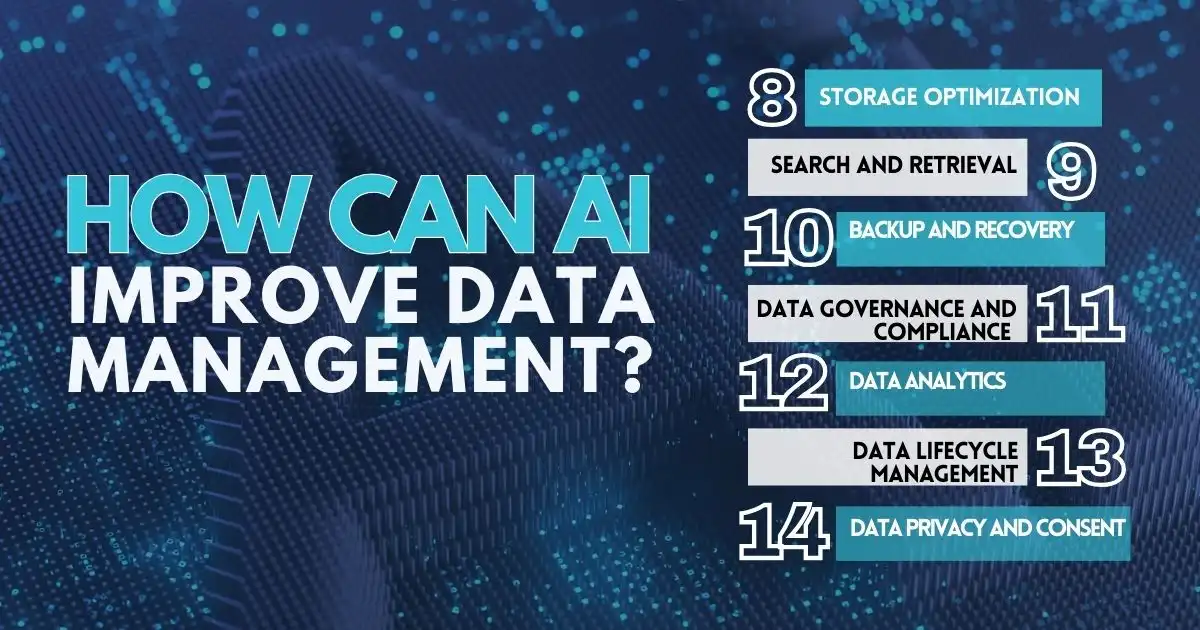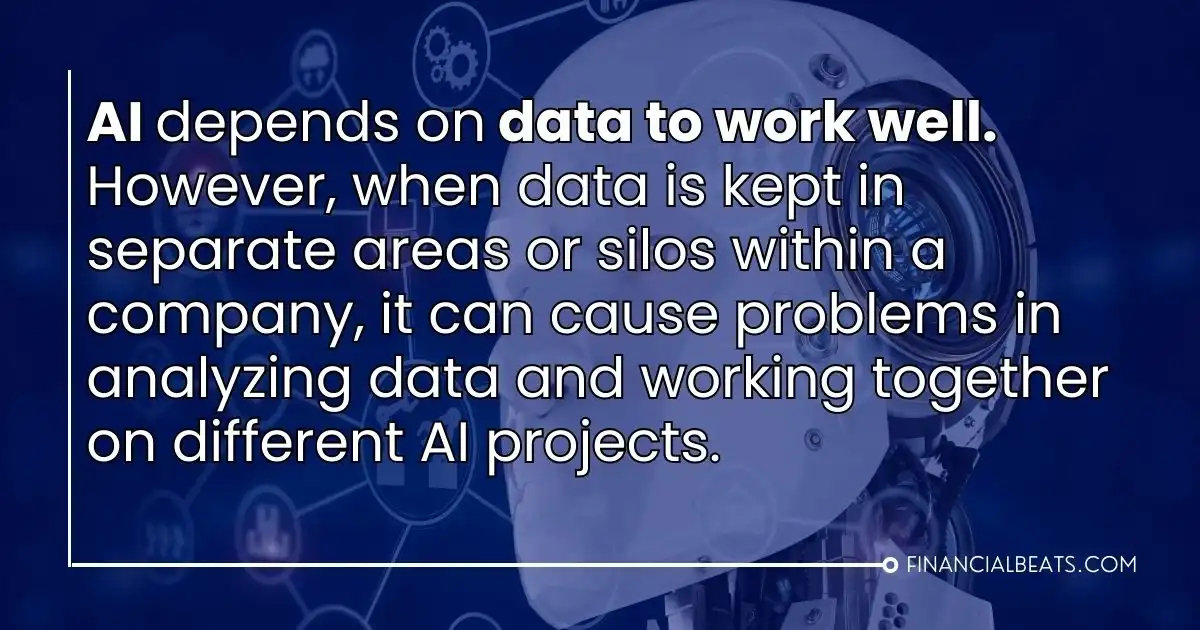A recent study by the International Data Corporation predicts a 23% annual increase in data creation from 2020 to 2025.
If you’ve ever felt like your business is struggling to keep up, it’s a familiar situation for many. Managing data today can feel overwhelming, especially with information coming from so many sources.
The need to organize and manage data effectively is growing, and the stakes are high for those aiming to stay competitive.
But what if there was a way to take control of all that data and turn it into a valuable resource for your business?
What is AI Data Management?
AI Data Management is the process of using artificial intelligence (AI) to help a company organize and handle its data better. It improves the quality of data, makes analysis easier, and helps people make smarter decisions.
This includes collecting, organizing, storing, and using data in a way that is safe and efficient. Good data management makes sure the data is accurate, easy to access, and protected. It’s important because it helps companies follow rules, make good choices, and stay ahead of the competition.
How can AI Improve Data Management?
AI helps improve how data is captured, organized, and used. Here are some ways AI is used for managing data:

Data Integration
AI brings together data from different places and formats, making it easier to organize and understand. It helps companies save time and effort by automatically combining the data. This is especially helpful for big businesses with lots of different types of information. With AI, everything stays consistent, making data easier to work with.
Data Cleaning
AI can find and fix mistakes in data, like duplicates or errors, so companies can rely on accurate information. This ensures that the decisions businesses make are based on good data. Cleaning the data by hand takes time, but AI can do it much faster. This saves time and helps businesses avoid making mistakes due to bad data.
Classification and Tagging
AI helps by organizing and labeling data, making it easier to find later. If companies have lots of documents or files, AI can sort them automatically. This saves time and helps people quickly find what they need. Organized data means faster and better results.
Data Noise
Errors in data can obscure important information. AI helps identify and reduce these inaccuracies, enhancing data quality. In banking, for instance, AI can distinguish between real and fraudulent transactions, protecting businesses and customers from financial losses.
Missing Data
Incomplete data can hinder a comprehensive understanding. AI can identify missing pieces and update data models to improve accuracy. For example, in online shopping, AI can fill in missing product details, leading to better recommendations and a smoother user experience.
Data Patterns
Finding patterns in large datasets can be time-consuming. AI accelerates this process by efficiently identifying key features and trends. In retail, for instance, AI can analyze sales data to uncover customer trends, helping businesses adapt their products and marketing strategies.
Data Security
AI helps keep data safe by detecting unusual activity, like cyberattacks. It can spot suspicious behavior that might threaten important information. When AI detects a problem, it helps companies take action right away. This helps prevent hackers from stealing or damaging data.

Storage Optimization
AI can move data that isn’t used as often to cheaper storage options. This makes data storage less expensive but still keeps important information easy to access. Through managing storage smartly, companies save money while ensuring that key data is available when needed.
Search and Retrieval
AI improves search engines by understanding what people are looking for, making it easier to find specific information. If it’s searching documents or large databases, AI helps locate the right data quickly. This saves time and allows employees to work more efficiently.
Backup and Recovery
AI helps keep data safe by automatically backing it up and making sure it can be recovered if lost. If something goes wrong, like a computer crash, AI helps retrieve the lost data faster. This prevents companies from losing important information and reduces downtime.
Data Governance and Compliance
AI makes sure businesses follow rules about how they handle personal data, like privacy laws. It tracks who has access to certain data and how it’s being used, ensuring everything is done properly. This helps companies avoid legal issues and keeps customer information safe.
Data Analytics
AI analyzes data to find trends and patterns, helping businesses make better decisions. It can quickly process large amounts of data to reveal useful insights that would take humans much longer to find out. This helps businesses stay competitive and improve their strategies.
Data Lifecycle Management
AI manages the entire journey of data—from when it’s created to when it’s no longer needed. It ensures data is stored, organized, and deleted at the right times. This keeps data management efficient and helps businesses follow industry regulations.
Data Privacy and Consent
AI helps manage customer consent for data use and ensures businesses handle data responsibly. This builds trust by giving customers more control over their personal information. AI also helps companies stay within privacy laws and protect sensitive data.
The AI Data Management Training and Outsourcing Challenge

Training AI systems to do specific jobs well requires a lot of data. Many companies hire gig workers from sites like Upwork, Online Jobs, and Mechanical Turk to do tasks that are hard to automate, such as solving CAPTCHAs, labeling data, and annotating text.
This collected data is then used to train AI models. However, these workers often receive low pay and are rushed to finish their tasks quickly.
Because of these problems, some gig workers are using tools like ChatGPT to help them earn more money. A group of researchers from the Swiss Federal Institute of Technology wanted to see how common this is. They hired 44 people from Amazon Mechanical Turk to summarize parts of medical research papers.
Using an AI model they trained, the researchers looked for signs that ChatGPT’s output was used, like repeating certain words. They also checked the workers’ keystrokes to find any copying and pasting that could mean they used outside help.
The study shared on arXiv, estimated that about 33% to 46% of the workers used AI models like ChatGPT. The researchers expect this number to grow as AI tools like ChatGPT get better and easier to use.
Ways to Get Rid of Data Silos in Organizations

AI depends on data to work well. However, when data is kept in separate areas or silos within a company, it can cause problems in analyzing data and working together on different AI projects.
This situation can lead to repeated work, wasted resources, and conflicting decisions based on the same data. Without a central system to oversee everything, keeping data quality consistent becomes difficult.
Managing data in one central place is important for AI to work its best. Solving this problem helps AI run smoothly and supports tasks like cleaning data, ensuring quality, following security rules, and improving processing skills.
To remove data silos while using AI, start by checking all the data sources to see how they are organized and connected. Next, set up a central data management system that helps with integration, consistency, and easy access for all departments. Encouraging teamwork with clear rules and ongoing training can help everyone use and share data better across departments.
Turning Data Chaos into Clear Insights
Using AI effectively in managing data can feel like a huge task, especially with the growing amount of information we receive. Fortunately, AI offers a way to turn this challenge into an opportunity. Your businesses can organize their data more effectively, improve decision-making, and maintain data security.
This leads to better results and allows companies to stay competitive in their industries. However, it’s essential to remember that simply using AI is not enough. Companies need to address data silos, ensure all data sources are connected, and promote teamwork across departments.
Thus, businesses can create a more efficient and effective data management system, enabling them to tap into the full potential of AI and create a data-driven future.
FAQs
What is a database artificial intelligence?
Database artificial intelligence refers to the application of AI technologies in managing and analyzing large databases. It enhances data retrieval, organization, and decision-making processes, making data management more efficient.
How can AI for data quality improve business operations?
AI for data quality ensures that data is accurate, consistent, and reliable. By automating data cleansing and validation processes, businesses can enhance their decision-making capabilities and reduce errors, leading to improved operational efficiency.
Which data management companies utilize AI technology?
Several data management companies leverage AI technology to optimize their services. Notable examples include IBM, Oracle, and Informatica, which use AI to improve data integration, management, and analysis.
What AI can handle the most amount of data?
Several AI systems are designed to handle large volumes of data effectively. Technologies like Apache Hadoop and cloud-based AI solutions can process vast datasets, making them ideal for organizations dealing with extensive data management challenges.
